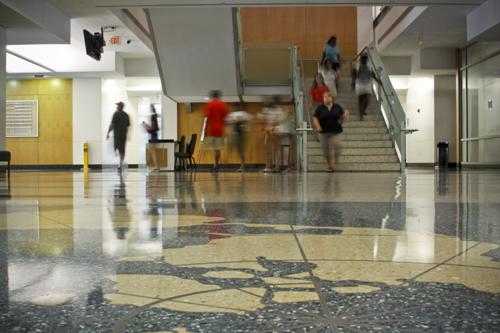
This post was written by Hatchet staff writer Aliya Karim.
Business school graduate students are disputing the $1,000 added to their tuition bills this fall, claiming the extra charge came without notice.
An additional $55 per-credit-hour fee was not included in a cost estimate handed out by the Global MBA Program last spring. The estimate, which brought tuition for the two-year program up to $123,085, pronounced the costs “subject to change,” but several students said they were unaware such a change had actually been made.
The Board of Trustees announced the tuition hike in February, but because the 4.4 percent increase is “within the range of the annual increase, [students] learn the rates through the university offices,” Dean Doug Guthrie said in an email.
The increase is also consistent with rates raised by many other business schools across the country. Last year, the business school raised tuition 3.5 percent for returning students.
Shashwat Gautam, a second-year MBA student who mortgages his home in India from the U.S., said he first found out about the increase when his tuition bill was emailed to students this month. He said the extra $1,100 he will owe the school this year will strain his already tight budget, because he applied for student loans using the previous tuition estimate.
“For middle class families from India and different parts of the world, it’s going to mean a lot,” said Gautam, the business school’s graduate representative for the Student Association. “We could’ve planned it better if we had an idea of it.”
Gautam, also the vice chair of SA’s academic affairs committee, said he is pushing the SA to lobby administrators to roll back the costs.
University spokeswoman Michelle Sherrard said tuition information is posted on both the University’s graduate enrollment and Colonial Central websites, but that details are not emailed to students because costs differ based on course load. “In addition, students applying for financial aid should be aware of tuition information well in advance,” she said in an email.
Associate Dean for MBA Programs Liesl Riddle sent an email to business graduate students addressing “tuition confusion and clarification” following The Hatchet’s inquiry into the school’s tuition bump.
She said in the email that the 4.4 percent increase falls within the standard practice of a 4 to 6 percent rise between a student’s first and second year, and maintained that the added tuition revenue would go toward expanding programming.
“Admissions sent you an estimated cost of attendance for the entire program when you enrolled and noted that second year tuition was an estimate that would likely change. In addition, the university posts the new rates in late spring for your review,” Riddle wrote.
Allan Simonds, a second-year MBA student, called the email “defensive and condescending,” and said it still did not clarify how the school would use the extra tuition money. “The email really pits the administration against the student body,” Simonds said.
The 4.4 percent increase is “not out of sync with general increases that we’re seeing in North America,” said Dan LeClair, the chief operating officer of the Association to Advance Collegiate Schools of Business. He said schools might increase tuition for course and curriculum improvement, global expansions, student engagement in the classroom and improved reputations.
Guthrie said in an email that the MBA tuition remained far below neighboring Georgetown University and University of Maryland, and a small increase in tuition would help pay for more student aid and programs, but did not specify which.
“If we want to have programs and student services that compare to those schools, we need also to have the resources that make us competitive,” Guthrie said.
Incoming MBA students will also face a 8.7 percent higher tuition than last year’s students, the steepest climb in an across-the-board tuition increase for graduate programs. New doctoral students in the Columbian College of Arts and Sciences and Graduate School of Education and Human Development and masters students in the Elliott School of International Affairs will see an 8.5 percent increase in tuition.
In addition to the extra tuition revenue, the business school is also receiving $9.4 million in cash from GW through 2014 – the largest investment in the history of the school.
Business school administrators have been busy both in D.C. and China in the past year, linking MBA students in planning the District’s economic development plan and opening up master’s programs in Suzhou. The business school also added four online graduate programs this summer.
“I do think and hope the extra money will go to benefit students and the school, and especially to increase our rankings,” Neha Shah, a second-year MBA student, said. “I also don’t realistically expect that I will personally get to enjoy these benefits in my last year as a student.”
The business school’s graduate program fell five spots to No. 57 in the U.S. News and World Report ranking in March.
Business students have soured on administrators’ communication effectiveness in the past. In Bloomberg Businessweek’s survey of undergraduate business students, many at GW cited issues of communication for administrators as one of the school’s problems.
“There are bright spots, but they have a long way to go,” Simonds said. “They should begin with better communication, more transparency and less squandering of money.”
– Cory Weinberg contributed to this report.




